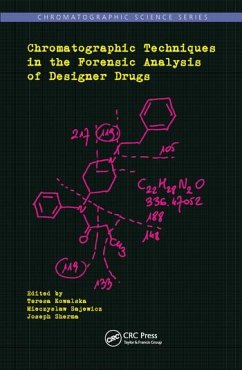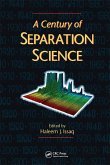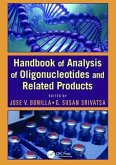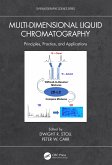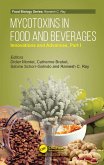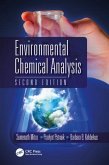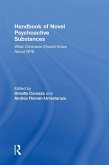Chromatographic Techniques in the Forensic Analysis of Designer Drugs
Herausgeber: Sherma, Joseph; Kowalska, Teresa; Sajewicz, Mieczyslaw
Chromatographic Techniques in the Forensic Analysis of Designer Drugs
Herausgeber: Sherma, Joseph; Kowalska, Teresa; Sajewicz, Mieczyslaw
- Broschiertes Buch
- Merkliste
- Auf die Merkliste
- Bewerten Bewerten
- Teilen
- Produkt teilen
- Produkterinnerung
- Produkterinnerung
This thoughtfully constructed edited reference presents the main chromatographic methodologies and strategies used to discover and analyze novel designer drugs contained in diverse biological materials.
Andere Kunden interessierten sich auch für
![A Century of Separation Science A Century of Separation Science]() A Century of Separation Science88,99 €
A Century of Separation Science88,99 €![Handbook of Analysis of Oligonucleotides and Related Products Handbook of Analysis of Oligonucleotides and Related Products]() Handbook of Analysis of Oligonucleotides and Related Products89,99 €
Handbook of Analysis of Oligonucleotides and Related Products89,99 €![Multi-Dimensional Liquid Chromatography Multi-Dimensional Liquid Chromatography]() Multi-Dimensional Liquid Chromatography269,99 €
Multi-Dimensional Liquid Chromatography269,99 €![Case Studies in Forensic Anthropology Case Studies in Forensic Anthropology]() Case Studies in Forensic Anthropology82,99 €
Case Studies in Forensic Anthropology82,99 €![Mycotoxins in Food and Beverages Mycotoxins in Food and Beverages]() Mycotoxins in Food and Beverages220,99 €
Mycotoxins in Food and Beverages220,99 €![Environmental Chemical Analysis Environmental Chemical Analysis]() S. MitraEnvironmental Chemical Analysis79,99 €
S. MitraEnvironmental Chemical Analysis79,99 €![Handbook of Novel Psychoactive Substances Handbook of Novel Psychoactive Substances]() Handbook of Novel Psychoactive Substances331,99 €
Handbook of Novel Psychoactive Substances331,99 €-
-
-
This thoughtfully constructed edited reference presents the main chromatographic methodologies and strategies used to discover and analyze novel designer drugs contained in diverse biological materials.
Produktdetails
- Produktdetails
- Chromatographic Science Series
- Verlag: Taylor & Francis Ltd
- Seitenzahl: 478
- Erscheinungstermin: 30. Juni 2020
- Englisch
- Abmessung: 154mm x 234mm x 33mm
- Gewicht: 916g
- ISBN-13: 9780367572280
- ISBN-10: 0367572281
- Artikelnr.: 66220991
- Herstellerkennzeichnung
- Libri GmbH
- Europaallee 1
- 36244 Bad Hersfeld
- gpsr@libri.de
- Chromatographic Science Series
- Verlag: Taylor & Francis Ltd
- Seitenzahl: 478
- Erscheinungstermin: 30. Juni 2020
- Englisch
- Abmessung: 154mm x 234mm x 33mm
- Gewicht: 916g
- ISBN-13: 9780367572280
- ISBN-10: 0367572281
- Artikelnr.: 66220991
- Herstellerkennzeichnung
- Libri GmbH
- Europaallee 1
- 36244 Bad Hersfeld
- gpsr@libri.de
Teresa Kowalska earned an MSc in chemistry from the former Pedagogical High School in Katowice, Poland, a PhD in physical chemistry from the University of Silesia, Katowice, and a DSc in physical chemistry from The Maria Curie-Sklodowska University in Lublin, Poland. She has authored and coauthored approximately 300 original research and review papers, 16 invited book chapters, and approximately 500 conference papers for scientific conferences. She is also coeditor-in-chief of the international chromatography journal Acta Chromatographica and an editorial board member for several chromatography journals. Her main research interests focus on applications of thin-layer, high-performance liquid and gas chromatography to physicochemical problems. Mieczyslaw Sajewicz earned an MSc and a PhD in chemistry from the University of Silesia, Katowice, Poland, and a DSc in pharmacy from Collegium Medicum, Jagiellonian University, Kraków, Poland. He has authored and coauthored over 150 original research papers, over 350 conference papers, an encyclopedia entry in Encyclopedia of Chromatography, Second Edition, and two book chapters. He is an editorial board member and coeditor-in-chief of Acta Chromatographica and an editorial board member for the analytical chemistry section of The Scientific World Journal. He is also a member of the Organizing Committee of the annual all-Polish Symposium on Chromatographic Methods of Investigating the Organic Compounds and co-chairman of the Scientific and Organizing Committee of the same event. Joseph Sherma is professor emeritus of chemistry at Lafayette College, Easton, Pennsylvania. He earned his PhD in analytical chemistry from Rutgers, the State University, New Brunswick, New Jersey, under the supervision of the renowned ion exchange chromatography expert William Rieman III. He taught courses in analytical chemistry for more than 40 years, was head of the Lafayette College Chemistry Department for 12 years, and continues to supervise research students. He has authored, coauthored, edited, or coedited more than 750 publications, including research papers and review articles; approximately 30 invited book chapters; and more than 65 books and U.S. government agency manuals in the areas of analytical chemistry and chromatography. He served for 23 years as editor for residues and trace elements of the Journal of AOAC International and is currently its acquisitions editor. He received the 1995 ACS Award for Research at an Undergraduate Institution sponsored by Research Corporation, and the first 2009 issue of the journal Acta Universitatis Cibiensis, Seria F, Chemia was dedicated in honor of his teaching, research, and publication accomplishments in analytical chemistry and chromatography.
Introduction. Designer Drugs: Legislating for Tomorrow Through the Use of
Class Definitions and Pharmacophore Principles. Alternative Legislation
with Designer Drugs. Biological Precursors of Designer Drugs. Liquid
Chromatography - Mass Spectrometry in Analysis of Designer Drugs. Ambient
Plasma Ionization Techniques in Forensic Analysis. Application of LC-QTOFMS
for the Identification of the Structure of New Psychoactive Substances.
Rapid Generation of Metabolites by Electrochemical Method. Gas
Chromatography - Mass Spectrometry in Analysis of Designer Drugs. NMR
Spectroscopy in the Analysis of Designer Drugs. Preparation of Biological
Material for Toxicological Analysis. Discrimination among the Designer Drug
Isomers by Chromatographic and Spectrometric Methods. Liquid
Chromatography-Mass Spectrometry and Ambient Mass Spectrometry Applied to
the Analysis of Synthetic Cannabinoids. Cathinone Derivatives and Their
Analysis. NBOMe Derivatives of Phenylethylamines and Their Analysis. 2C
Derivatives of Phenylethylamines and Their Analysis. Modern Techniques for
the Analysis of Piperazines. Fenantyl Analogues and Their Analysis. Modern
Techniques for the Identification of Tryptamines. Toxicological Analysis of
New Opioids. Toxicological Analysis of Designer Benzodiazepines. Thin-layer
Chromatography in the Analysis of Designer Drugs
Class Definitions and Pharmacophore Principles. Alternative Legislation
with Designer Drugs. Biological Precursors of Designer Drugs. Liquid
Chromatography - Mass Spectrometry in Analysis of Designer Drugs. Ambient
Plasma Ionization Techniques in Forensic Analysis. Application of LC-QTOFMS
for the Identification of the Structure of New Psychoactive Substances.
Rapid Generation of Metabolites by Electrochemical Method. Gas
Chromatography - Mass Spectrometry in Analysis of Designer Drugs. NMR
Spectroscopy in the Analysis of Designer Drugs. Preparation of Biological
Material for Toxicological Analysis. Discrimination among the Designer Drug
Isomers by Chromatographic and Spectrometric Methods. Liquid
Chromatography-Mass Spectrometry and Ambient Mass Spectrometry Applied to
the Analysis of Synthetic Cannabinoids. Cathinone Derivatives and Their
Analysis. NBOMe Derivatives of Phenylethylamines and Their Analysis. 2C
Derivatives of Phenylethylamines and Their Analysis. Modern Techniques for
the Analysis of Piperazines. Fenantyl Analogues and Their Analysis. Modern
Techniques for the Identification of Tryptamines. Toxicological Analysis of
New Opioids. Toxicological Analysis of Designer Benzodiazepines. Thin-layer
Chromatography in the Analysis of Designer Drugs
Introduction. Designer Drugs: Legislating for Tomorrow Through the Use of
Class Definitions and Pharmacophore Principles. Alternative Legislation
with Designer Drugs. Biological Precursors of Designer Drugs. Liquid
Chromatography - Mass Spectrometry in Analysis of Designer Drugs. Ambient
Plasma Ionization Techniques in Forensic Analysis. Application of LC-QTOFMS
for the Identification of the Structure of New Psychoactive Substances.
Rapid Generation of Metabolites by Electrochemical Method. Gas
Chromatography - Mass Spectrometry in Analysis of Designer Drugs. NMR
Spectroscopy in the Analysis of Designer Drugs. Preparation of Biological
Material for Toxicological Analysis. Discrimination among the Designer Drug
Isomers by Chromatographic and Spectrometric Methods. Liquid
Chromatography-Mass Spectrometry and Ambient Mass Spectrometry Applied to
the Analysis of Synthetic Cannabinoids. Cathinone Derivatives and Their
Analysis. NBOMe Derivatives of Phenylethylamines and Their Analysis. 2C
Derivatives of Phenylethylamines and Their Analysis. Modern Techniques for
the Analysis of Piperazines. Fenantyl Analogues and Their Analysis. Modern
Techniques for the Identification of Tryptamines. Toxicological Analysis of
New Opioids. Toxicological Analysis of Designer Benzodiazepines. Thin-layer
Chromatography in the Analysis of Designer Drugs
Class Definitions and Pharmacophore Principles. Alternative Legislation
with Designer Drugs. Biological Precursors of Designer Drugs. Liquid
Chromatography - Mass Spectrometry in Analysis of Designer Drugs. Ambient
Plasma Ionization Techniques in Forensic Analysis. Application of LC-QTOFMS
for the Identification of the Structure of New Psychoactive Substances.
Rapid Generation of Metabolites by Electrochemical Method. Gas
Chromatography - Mass Spectrometry in Analysis of Designer Drugs. NMR
Spectroscopy in the Analysis of Designer Drugs. Preparation of Biological
Material for Toxicological Analysis. Discrimination among the Designer Drug
Isomers by Chromatographic and Spectrometric Methods. Liquid
Chromatography-Mass Spectrometry and Ambient Mass Spectrometry Applied to
the Analysis of Synthetic Cannabinoids. Cathinone Derivatives and Their
Analysis. NBOMe Derivatives of Phenylethylamines and Their Analysis. 2C
Derivatives of Phenylethylamines and Their Analysis. Modern Techniques for
the Analysis of Piperazines. Fenantyl Analogues and Their Analysis. Modern
Techniques for the Identification of Tryptamines. Toxicological Analysis of
New Opioids. Toxicological Analysis of Designer Benzodiazepines. Thin-layer
Chromatography in the Analysis of Designer Drugs

